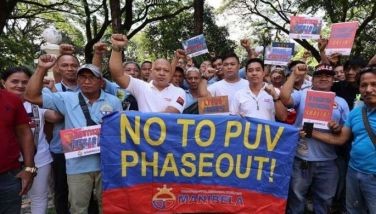SC moves to address flip-flopping
MANILA, Philippines - Chief Justice Ma. Lourdes Sereno has announced a “strategy” to avoid flip-flopping in Supreme Court (SC) decisions.
In an interview with The STAR, Sereno said the new measure is part of her program to speed up resolution of cases in the SC.
“Before promulgation, we make sure our decisions are consistent with previous rulings of the court,” she said.
Sereno said SC justices in the new system would check a decision vis-à-vis previous rulings on related or similar cases to determine if there are inconsistencies.
“This way, we will be able to stabilize jurisprudence,” she said.
Sereno has distinguished flip-flopping from mere “abandoning of doctrines as a corrective act directed towards a more just result.”
Prior to Sereno’s appointment as chief justice in 2012, the SC has been criticized for flip-flopping on several cases.
Just last month, the Special Third Division stopped the implementation of its 2006 order for garnishment of some P62 billion in assets of Power Sector Assets and Liabilities Management Corp. (PSALM) to compensate National Power Corp. (Napocor) employees who were illegally terminated in 2003.
It stopped the execution of its earlier rulings for reinstatement or payment of separation benefits of the 5,000 employees.
Last June, the same division issued a resolution rejecting Napocor’s plea to defer execution of the garnishment order through a temporary restraining order (TRO).
The STAR also learned that the earlier ruling was final and executory and had an entry of judgment.
Last July, the SC division cited Napocor for indirect contempt for defying the orders.
In the latest resolution, the SC division decided to grant Napocor’s request and stopped the execution of the writs of garnishment after receiving letters from the executive branch about “possible injurious effects on the economy as well as the energy sector.”
A Quezon City court issued the writs pursuant to the SC’s Sept. 26, 2006 decision voiding National Power Board (NPB) Resolution Nos. 2002-1242 and 2002-125 directing termination from the service of 5,000 employees of Napocor on Jan. 31, 2003 in line with its restructuring under Republic Act No. 9311 (Electric Power Industry Reform Act of 2001 or EPIRA).
The SC subsequently held that the illegally dismissed employees were entitled to reinstatement or payment of separation benefits.
The order was issued to “allow the Court to determine who are entitled to be paid under the terms of its previous resolutions and how much each is entitled to be paid.”
Associate Justice Arturo Brion wrote both rulings.
In 2011, the SC was criticized for flip-flopping in its ruling on the constitutionality of laws passed by the 11th Congress that paved the way for the conversion into cities of 16 municipalities.
The SC ruled on that case several times.
In its first decision in November 2008, the SC declared the so-called cityhood laws unconstitutional.
It became final and executory upon order on May 21, 2009.
However, in December 2009, the SC again reversed its final decision and issued another ruling declaring the laws constitutional.
In February and April 2011, the SC stood by its second ruling.
- Latest
- Trending





























